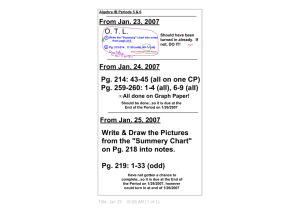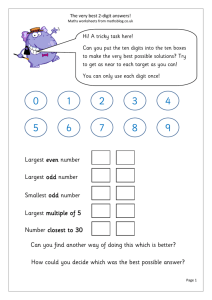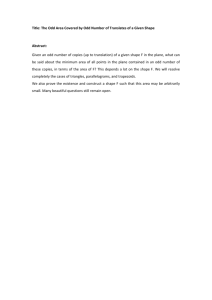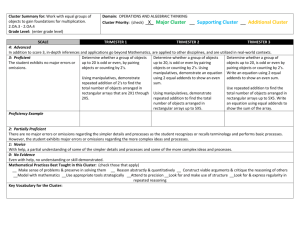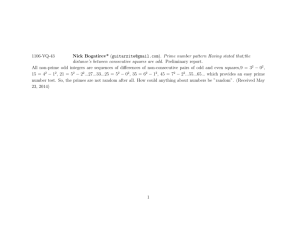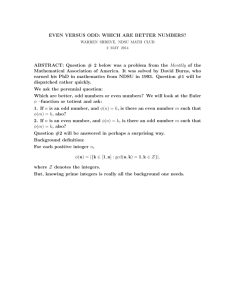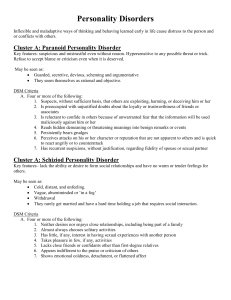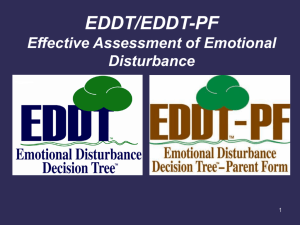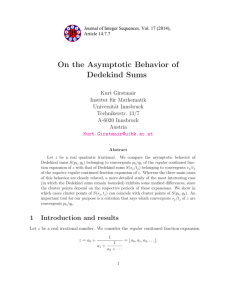DSM-IV Personality Disorder Criteria: Shorthand & Commentary
advertisement
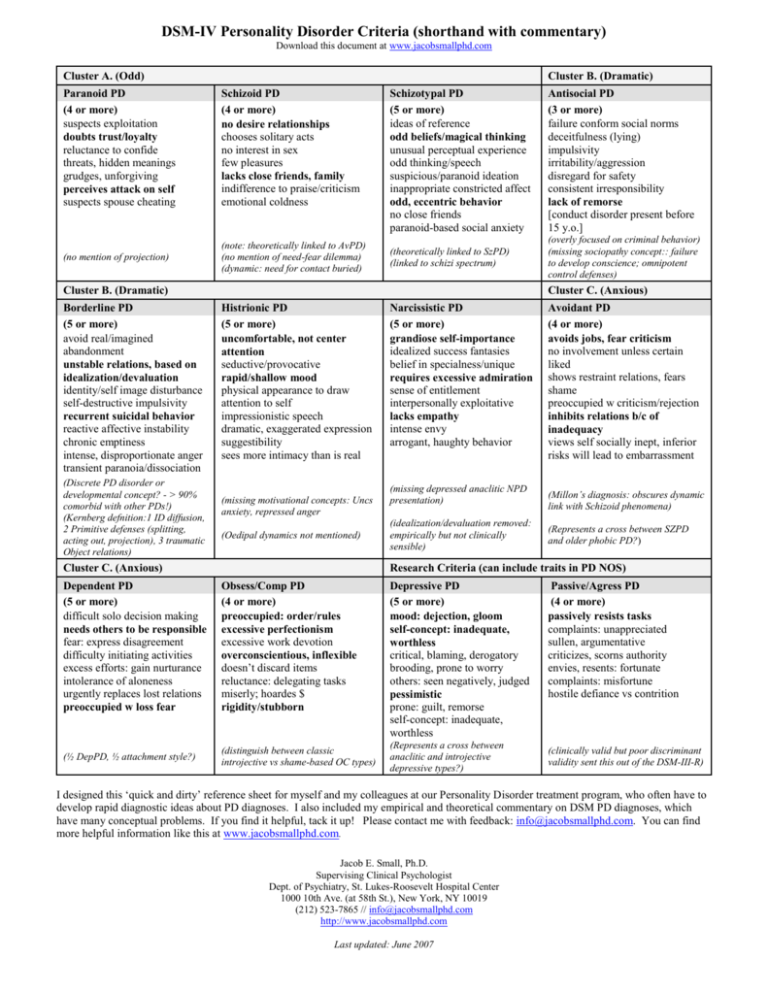
DSM-IV Personality Disorder Criteria (shorthand with commentary) Download this document at www.jacobsmallphd.com Cluster A. (Odd) Cluster B. (Dramatic) Paranoid PD (4 or more) suspects exploitation doubts trust/loyalty reluctance to confide threats, hidden meanings grudges, unforgiving perceives attack on self suspects spouse cheating Schizoid PD (4 or more) no desire relationships chooses solitary acts no interest in sex few pleasures lacks close friends, family indifference to praise/criticism emotional coldness (no mention of projection) (note: theoretically linked to AvPD) (no mention of need-fear dilemma) (dynamic: need for contact buried) Schizotypal PD (5 or more) ideas of reference odd beliefs/magical thinking unusual perceptual experience odd thinking/speech suspicious/paranoid ideation inappropriate constricted affect odd, eccentric behavior no close friends paranoid-based social anxiety Antisocial PD (3 or more) failure conform social norms deceitfulness (lying) impulsivity irritability/aggression disregard for safety consistent irresponsibility lack of remorse [conduct disorder present before 15 y.o.] (theoretically linked to SzPD) (linked to schizi spectrum) (overly focused on criminal behavior) (missing sociopathy concept:: failure to develop conscience; omnipotent control defenses) Cluster B. (Dramatic) Borderline PD (5 or more) avoid real/imagined abandonment unstable relations, based on idealization/devaluation identity/self image disturbance self-destructive impulsivity recurrent suicidal behavior reactive affective instability chronic emptiness intense, disproportionate anger transient paranoia/dissociation (Discrete PD disorder or developmental concept? - > 90% comorbid with other PDs!) (Kernberg defnition:1 ID diffusion, 2 Primitive defenses (splitting, acting out, projection), 3 traumatic Object relations) Cluster C. (Anxious) Histrionic PD (5 or more) uncomfortable, not center attention seductive/provocative rapid/shallow mood physical appearance to draw attention to self impressionistic speech dramatic, exaggerated expression suggestibility sees more intimacy than is real (missing motivational concepts: Uncs anxiety, repressed anger (Oedipal dynamics not mentioned) Cluster C. (Anxious) Narcissistic PD (5 or more) grandiose self-importance idealized success fantasies belief in specialness/unique requires excessive admiration sense of entitlement interpersonally exploitative lacks empathy intense envy arrogant, haughty behavior Avoidant PD (4 or more) avoids jobs, fear criticism no involvement unless certain liked shows restraint relations, fears shame preoccupied w criticism/rejection inhibits relations b/c of inadequacy views self socially inept, inferior risks will lead to embarrassment (missing depressed anaclitic NPD presentation) (Millon’s diagnosis: obscures dynamic link with Schizoid phenomena) (idealization/devaluation removed: empirically but not clinically sensible) (Represents a cross between SZPD and older phobic PD?) Research Criteria (can include traits in PD NOS) Dependent PD (5 or more) difficult solo decision making needs others to be responsible fear: express disagreement difficulty initiating activities excess efforts: gain nurturance intolerance of aloneness urgently replaces lost relations preoccupied w loss fear Obsess/Comp PD (4 or more) preoccupied: order/rules excessive perfectionism excessive work devotion overconscientious, inflexible doesn’t discard items reluctance: delegating tasks miserly; hoardes $ rigidity/stubborn (½ DepPD, ½ attachment style?) (distinguish between classic introjective vs shame-based OC types) Depressive PD (5 or more) mood: dejection, gloom self-concept: inadequate, worthless critical, blaming, derogatory brooding, prone to worry others: seen negatively, judged pessimistic prone: guilt, remorse self-concept: inadequate, worthless (Represents a cross between anaclitic and introjective depressive types?) Passive/Agress PD (4 or more) passively resists tasks complaints: unappreciated sullen, argumentative criticizes, scorns authority envies, resents: fortunate complaints: misfortune hostile defiance vs contrition (clinically valid but poor discriminant validity sent this out of the DSM-III-R) I designed this ‘quick and dirty’ reference sheet for myself and my colleagues at our Personality Disorder treatment program, who often have to develop rapid diagnostic ideas about PD diagnoses. I also included my empirical and theoretical commentary on DSM PD diagnoses, which have many conceptual problems. If you find it helpful, tack it up! Please contact me with feedback: info@jacobsmallphd.com. You can find more helpful information like this at www.jacobsmallphd.com. Jacob E. Small, Ph.D. Supervising Clinical Psychologist Dept. of Psychiatry, St. Lukes-Roosevelt Hospital Center 1000 10th Ave. (at 58th St.), New York, NY 10019 (212) 523-7865 // info@jacobsmallphd.com http://www.jacobsmallphd.com Last updated: June 2007
